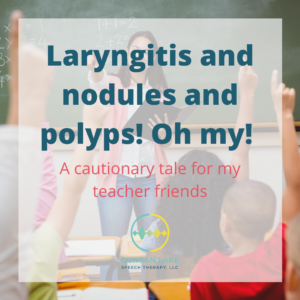by Tamiko Teshima, M.A., CCC-SLP
Speech-Language Pathologist and Practice Owner
Duncan Lake Speech Therapy, LLC
I feel like I talk a lot about vocal hygiene and why it’s important. Sometimes, though, it’s hard to understand why things are important unless one sees the potential outcomes of not doing them. So, my friends, it’s tough love time! It’s time to unveil some of the scary consequences of not having healthy vocal habits, especially as it pertains to teachers.

If you’ve followed this account for a while, you already know that teachers are at higher risk than any other profession (even more than singers!) for developing vocal problems. 10-15% of teachers have a voice disorder at any given time, and 1 in 10 teachers is forced to modify their job or leave the profession altogether due to voice disorders. YIKES! Vocal hygiene is important!
When I say “voice disorders,” what am I talking about? Let’s break down a few voice disorders common in teachers.
Laryngitis
We have all had this one, teachers and non-teachers alike. Laryngitis is an inflammation of the larynx, or your “voice box,” which holds your vocal folds. When your vocal folds become inflamed, your voice can sound hoarse or it might disappear altogether. Treatment is easy – vocal rest! And absolutely NO WHISPERING. Prolonged whispering is damaging to the vocal folds. This, in addition to using healthy vocal hygiene strategies, will help laryngitis go away.
…ok, that one’s not so scary.
Vocal Nodules
Vocal nodules are small growths on the vocal folds that are caused from significant overuse of the voice and vocal abuse (lots of yelling, not doing vocal hygiene strategies). Breathy, low pitched voice is a typical symptom, but it can also be accompanied by pain in the neck or a feeling of a “lump in the throat.” It is typically diagnosed by an ENT doctor through the use of a flexible endoscopy, or a camera on a stick that they put into your nose to see your vocal folds (#toughlove). The absolute best treatment for vocal nodules is PREVENTION through proper vocal hygiene. However, as long as the vocal nodules aren’t recurring, behavioral modifications are a good treatment. Recurring nodules may require surgery, but I’m telling you, you don’t want to go here. Ask Julie Andrews.
Vocal Polyps
Vocal polyps are growths on the vocal folds (bigger than nodules) caused by vocal overuse, vocal abuse, or phonotrauma (one time big vocal abuse event). With vocal polyps, one’s voice sounds breathy and rough, and can often have pitch breaks.Like vocal nodules, pain in the neck can also accompany the voice changes. This is also diagnosed through a nasal endoscopy (fun!). Behavioral changes may help to treat polyps, but surgery is often needed. It is not a quick fix process with surgery, though. Pre and post surgery voice therapy is needed for a good recovery.
My dear teacher friends, please take care of your voices. Participate in vocal hygiene strategies! And non-teachers, you are not exempt from this. Voice disorders occur in 5-10% of the general population, so everyone needs to be on point with their vocal health.
Just to be sure we all know the strategies, I’ve attached my vocal hygiene handout to this post again!



Recent Comments